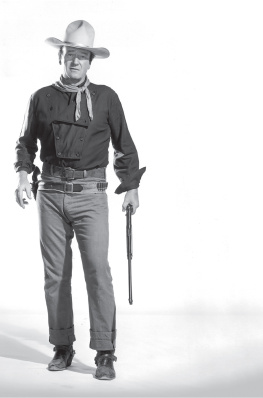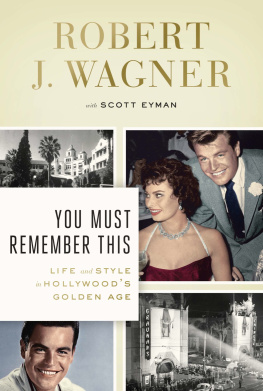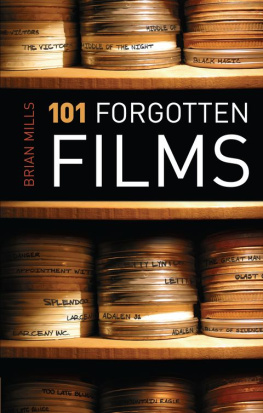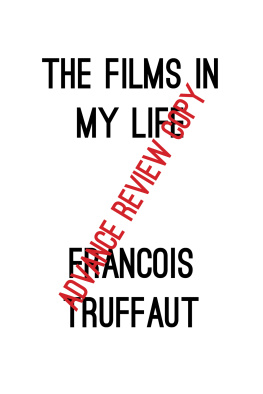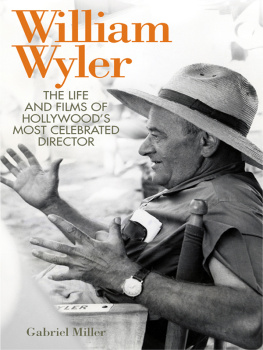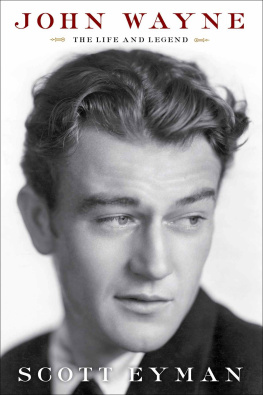Thank you for downloading this Simon & Schuster eBook.
Join our mailing list and get updates on new releases, deals, bonus content and other great books from Simon & Schuster.
C LICK H ERE T O S IGN U P
or visit us online to sign up at
eBookNews.SimonandSchuster.com
We hope you enjoyed reading this Simon & Schuster eBook.
Join our mailing list and get updates on new releases, deals, bonus content and other great books from Simon & Schuster.
C LICK H ERE T O S IGN U P
or visit us online to sign up at
eBookNews.SimonandSchuster.com
also by scott eyman
John Wayne: The Life and Legend
Empire of Dreams: The Epic Life of Cecil B. DeMille
Lion of Hollywood: The Life and Legend of Louis B. Mayer
John Ford: The Complete Films, 18941973
Print the Legend: The Life and Times of John Ford
The Speed of Sound: Hollywood and the Talkie Revolution, 1926-1930
Mary Pickford: Americas Sweetheart
Five American Cinematographers
With Louis Giannetti
Flashback: A Brief History of Film
With Robert Wagner
You Must Remember This: Life and Style in Hollywoods Golden Age
Pieces of My Heart: A Life

S IMON & S CHUSTER P APERBACKS
An Imprint of Simon & Schuster, Inc.
1230 Avenue of the Americas
New York, New York 10020
www.SimonandSchuster.com
Copyright 1993 by Scott Eyman
All rights reserved, including the right of reproduction in whole or in part in any form. For information address Simon & Schuster Paperbacks Subsidiary Rights Department, 1230 Avenue of the Americas, New York, NY 10020.
First Simon & Schuster paperback edition April 2015
S IMON & S CHUSTER P APERBACKS and colophon are registered trademarks of Simon & Schuster, Inc.
Designed by Nina DAmario/Levavi & Levavi
Portrait of Ernst Lubitsch mptvimages.com
The Library of Congress has cataloged the hardcover edition as follows:
Eyman, Scott, date.
Ernst Lubitsch: laughter in paradise / Scott Eyman.
p. cm
Filmography: p.
Includes bibliographical references and index.
1. Lubitsch, Ernst, 1892-1947. 2. Motion picture producers and directorsUnited StatesBiography. I. Title.
PN1998.3.L83E95 1993
791.43'0233'092dc20
[B]93-25608
CIP
ISBN: 0-671-74936-6
ISBN: 978-1-5011-0381-0 (pbk)
ISBN: 978-1-5011-0382-7 (ebook)
in loving memory of lily latt and fritz lang, who also came to america
contents
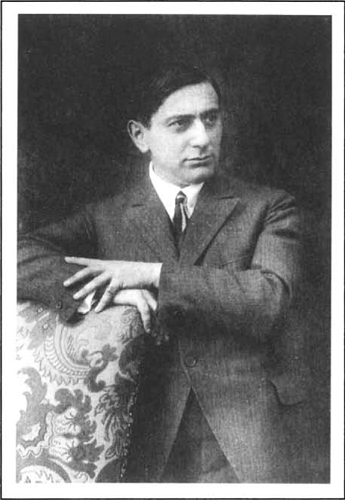
Ernst Lubitsch, rising young director, in an official portrait, circa 1920.
In that Golden Age of Hollywood that everybodys always talking about there were only two directors whose names meant anything to the public and critics: Cecil B. DeMille and Ernst Lubitsch.
claudette colbert
None of us thought we were making anything but entertainment for the moment. Only Ernst Lubitsch knew we were making art.
john ford
Id like to repay you...
All right, give me a letter of introduction to Lubitsch.
I might be able to do that too... Whos Lubitsch?
from preston sturgess sullivans travels
prologue
Los Angeles
Thursday, March 13, 1947
The pain was growing worse, much worse, and he believed he was about to die.
The angina had begun just after he walked off the stage of the Shrine Auditorium clutching the surprisingly heavy Academy Award, even as the crowd was applauding.
He knew the pain well by this time, the heavy, wheezing, crunching aggression in the chest that sliced off his breathing. And he knew what it could mean. It might last three minutes, or as long as six or seven, but he could never tell if it would dissipate or escalate. If the latter, it was a heart attack, and he knew that this one would almost certainly kill him. By now, his heart was so fragile, so ragged, that almost any stress or physical exertion, even something so small as hefting the eight-and-a-half-pound Oscar, would deprive his heart of oxygen and sugar and send it into convulsive straining.
He made his way through the backstage area, then the press area, where he managed a tight smile for the photographers. What to do? If he panicked and yelled for help, he might make it worse, might lose consciousness. He arrived at the stage door and decided to sit and wait for Otto to come with the car. He would try to will the pain away.
Later, he would say that the experience was the most terrifying and humiliating of his life. Sitting on the rear steps of the Shrine, with people going back and forth, nobody paying any attention. And Otto? Where was Otto? My God, thought Ernst Lubitsch, I hope Im not going to die sitting here with an Oscar in my hand.
A few minutes before, Mervyn LeRoy, who exemplified the smooth, anonymous Hollywood machine from which Lubitsch had always quietly distanced himself, had presented him with an honorary Academy Award. LeRoys speech described the arrival twenty-five years before of a dark stranger with a rather stern face, a big black cigar, and the merriest pair of eyes under the sun...
He had an adult mind and a hatred of saying things the obvious way. Because of these qualities and a God-given genius he advanced the technique of screen comedy as no one else has ever done.
Suddenly the pratfall and the double take were left behind and the sources of deep inner laughter were tapped. The housebroken camera learned to stop at a closed door instead of peeking gawkily through a keyhole. A master of innuendo had arrived.
Ten minutes later, Ernst Lubitsch was bargaining with the God he had never particularly believed in not to kill him.
Otto Werner finally made it through the traffic jam that had held him up, and helped his friend and employer into the car. The fast and expert medical attention of Lubitschs personal physician, Dr. Max Edel, managed to pull him out of yet another cardiac episode.
Ernst Lubitsch was right about one thing; he was indeed dying, but not quite yet. On the night of March 13, 1947, a night set aside to honor his signal contributions to the art of cinema, Ernst Lubitsch had slightly more than eight months to live.
Whos Lubitsch?
Its a short question with a long answer.
He directed Garbo in Ninotchka, her most radiant performance, her most famous film, and her only successful comedy.
In early, astonishingly fluid talkies like The Love Parade, Monte Carlo, and The Merry Widow he created the movie musical, and, in the process, the careers of Maurice Chevalier and Jeanette MacDonald.
He made stars of Pola Negri and Emil Jannings, but was particularly valued for his ability to cajole difficult, neurotic performers like Norma Shearer, Jennifer Jones, and Gene Tierney, relax them so they could give their finest performances.
When Marlene Dietrichs career was ebbing because of the rarified vehicles with which Josef von Sternberg had saturated the public, he devised an approach that gave her a new lease on life.
When Paramount Pictures was foundering while trying to escape from bankruptcy, he took over as production head, the only major director in Hollywood history to run a large movie studio.
In a Hollywood career lasting a quarter-century, he was the only studio director whose work was contractually sacrosanct, immune from tampering by studio heads like Jack Warner and Darryl Zanuck.
He crafted entertainments of radiant, rarified sophistication like Trouble in Paradise and Design for Living, as well as the unsurpassable human warmth and charm that freely flows through The Shop Around the Corner and To Be or Not to Be.
Next page

